Spring 2019
ANTH 89: Blackness and Racialization: A Multidimensional Approach
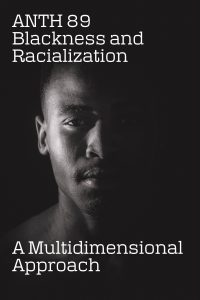 Introduces students to the history, social construction, cultural production, and lived experience of race, racialization, and racial identity. The course focuses on “Blackness” in the United States (with occasional reference to Jamaica for comparison), though it necessarily addresses other race formations such as “Whiteness” and “Brownness.” The course approaches racialization from four perspectives: historical; structural-institutional; personal-individual; and ethnographic. Major course goals include showing the various ways that race is socially constructed and preparing students to think and talk intelligently about race.
Introduces students to the history, social construction, cultural production, and lived experience of race, racialization, and racial identity. The course focuses on “Blackness” in the United States (with occasional reference to Jamaica for comparison), though it necessarily addresses other race formations such as “Whiteness” and “Brownness.” The course approaches racialization from four perspectives: historical; structural-institutional; personal-individual; and ethnographic. Major course goals include showing the various ways that race is socially constructed and preparing students to think and talk intelligently about race.
ANTH 439: Political Ecology
Dr. Don Nonini
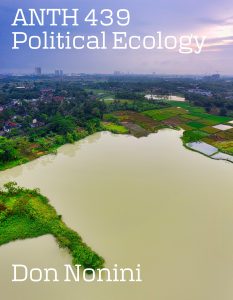 This course explores the ecological and political processes through which “nature” and the city encounter each other as these processes reinforce racial, class and gender inequalities. We deal with the metabolism of food, water and energy flows that connect cities and countryside but traverse and reinforce these inequalities; with urban-based environmental racism; and with contestations over urban infrastructures and the commons.
This course explores the ecological and political processes through which “nature” and the city encounter each other as these processes reinforce racial, class and gender inequalities. We deal with the metabolism of food, water and energy flows that connect cities and countryside but traverse and reinforce these inequalities; with urban-based environmental racism; and with contestations over urban infrastructures and the commons.
AAAD461: Race, Gender, & Activism in Cuba
Dr. Maya J. Berry
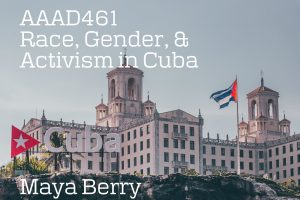 Examines black activism in Cuba from historical and contemporary perspectives. Students are led through a simulated experience of ethnographic fieldwork, where they will forge their own understanding of how a cross-section of Afro-Cubans have re-imagined and are re-imaging political possibility in the contemporary moment when Cuba is “re-opening” for business. The course features a range of examples demonstrating a diversity of approaches to social change.
Examines black activism in Cuba from historical and contemporary perspectives. Students are led through a simulated experience of ethnographic fieldwork, where they will forge their own understanding of how a cross-section of Afro-Cubans have re-imagined and are re-imaging political possibility in the contemporary moment when Cuba is “re-opening” for business. The course features a range of examples demonstrating a diversity of approaches to social change.
ANTH 567: Urban Anthropology
Dr. Don Nonini
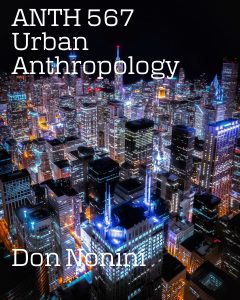 This course examines the racial, class, gendered and related inequalities that are reinforced (and challenged) in cities; it considers the projects of domination over urban spaces and people associated with neoliberal globalization, transnational migration and infrastructure “development”; and it explores social movements against environmental racism and dispossession, and the making of urban commons. (No Prerequisites.)
This course examines the racial, class, gendered and related inequalities that are reinforced (and challenged) in cities; it considers the projects of domination over urban spaces and people associated with neoliberal globalization, transnational migration and infrastructure “development”; and it explores social movements against environmental racism and dispossession, and the making of urban commons. (No Prerequisites.)
GLBL 703: Global Migration
Dr. Angela Stuesse
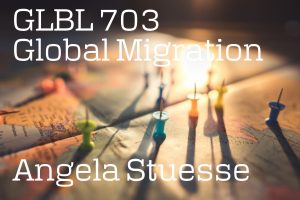 What factors shape human migration worldwide? How are processes of mobility regulated? How does migration transform both sending and receiving societies, and what does it teach us about citizenship and belonging? This seminar will enable you to think critically about and contribute thoughtfully to debates about the primary economic, humanitarian, and political forces and inequalities driving, sustaining, and governing the phenomenon of contemporary global migration.
What factors shape human migration worldwide? How are processes of mobility regulated? How does migration transform both sending and receiving societies, and what does it teach us about citizenship and belonging? This seminar will enable you to think critically about and contribute thoughtfully to debates about the primary economic, humanitarian, and political forces and inequalities driving, sustaining, and governing the phenomenon of contemporary global migration.
ANTH 711: Feminist Ethnography
Dr. Florence Babb
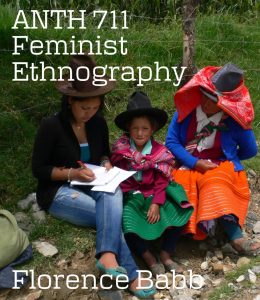 This graduate seminar considers issues in qualitative research methodology through reading and discussing feminist ethnographies, critical assessments of feminist scholarship and methods, and related work. We ask challenging questions about the relation of gender to race, class, and sexuality, and about the dilemmas of field research, including the fundamental question of whether there is indeed a feminist ethnographic methodology. Moreover, we discuss the feminist politics of ethnographic representation (by the researcher depicting the researched) and of positionality (of the researcher in relation to the researched). Race is a fundamental aspect of all of these considerations in the seminar.
This graduate seminar considers issues in qualitative research methodology through reading and discussing feminist ethnographies, critical assessments of feminist scholarship and methods, and related work. We ask challenging questions about the relation of gender to race, class, and sexuality, and about the dilemmas of field research, including the fundamental question of whether there is indeed a feminist ethnographic methodology. Moreover, we discuss the feminist politics of ethnographic representation (by the researcher depicting the researched) and of positionality (of the researcher in relation to the researched). Race is a fundamental aspect of all of these considerations in the seminar.
ANTH 898: Decolonizing Methodologies
Dr. Angela Stuesse
 With a focus on the fundamental connection between critical social theory and qualitative inquiry, in this class students will explore the challenges of decolonization, the promise of participatory methodologies, and the politics, problems, and practice of engaged research.
With a focus on the fundamental connection between critical social theory and qualitative inquiry, in this class students will explore the challenges of decolonization, the promise of participatory methodologies, and the politics, problems, and practice of engaged research.